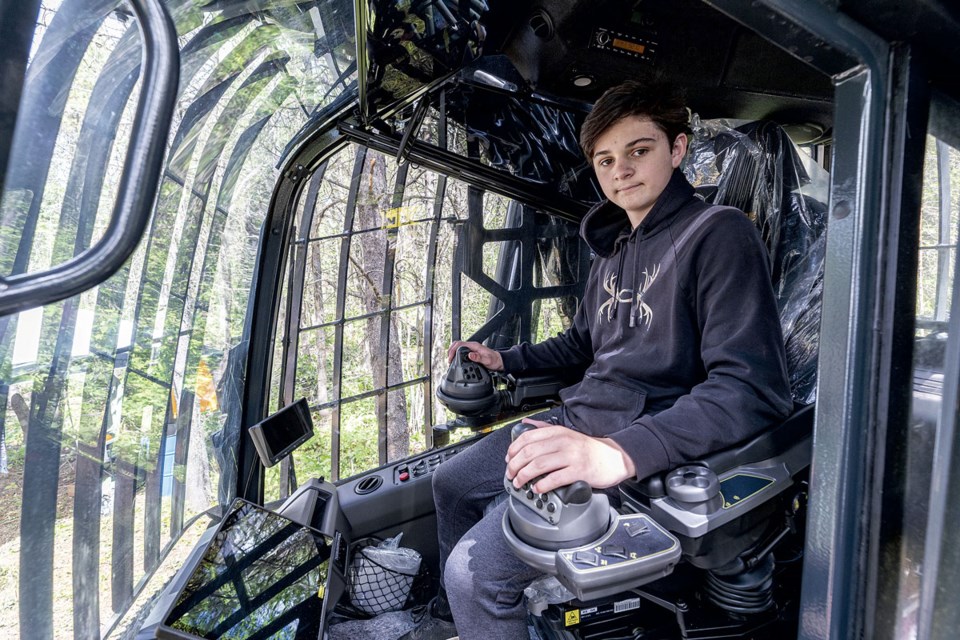Hans-Loic Fuhrer is a big fan of Formula One racing and says it’s his dream job to be working in motorsport’s most prestigious race series as an engineer.
If that fails to pan out, the Prince George teen has the option to pursue a job that would get him hired in a heartbeat.
“I wouldn’t want to race," he said. "I would rather be a race engineer of some sort, behind the scenes, and if that doesn’t work I’d probably do something in forestry."
The forest industry needs heavy equipment operators and at age 15 Fuhrer has already proven he has what it takes to run a cut-to-length harvester.
His parents own Valhalla Equipment, the Ponsse harvester/forwarder equipment dealership in Prince George. He started learning how to operate those million-dollar machines when he was just a young boy, using a simulator.
The simulator replicates the hand controls and foot pedals that would operate a cut-to-length harvester which fells, delimbs and cuts trees to measured lengths in an actual logging operation. Much like a video game, it runs on software linked to video screens and uses the same controls that are in a real machine, so the trainee can learn how to operate it safely.
Fuhrer started practicing his logging skills with the simulator when he was eight.
“Since it’s a flatscreen it’s difficult at first to get perspective, but otherwise it’s pretty handy, you learn everything at a basic level pretty quickly,” said Fuhrer.
He picked up his first actual load of logs in the woods when he was 12.
“I did a forwarder load on my own with my brother and sister in the cab,” Fuhrer said, adding he doesn't do this as a job, but for the experience. "It's very occasional. I have fun with them every once in a while.”
Used in selective logging/thinning, the harvester-and-forwarder method is considered less destructive to the forest floor because the cut logs are picked up and brought to the landing area rather than dragged with a skidder.
Selective logging is being touted by local proponents as the wave of the future for forestry in the province. They say it will eventually replace clearcutting as the predominant harvesting method because it utilizes trees growing in 30-year-old cut blocks that are common throughout northern B.C. Those younger stands already have road access and are easily accessible to forestry companies struggling to find enough economically available fibre to keep their sawmills and pulpmills operating.
Larger harvesters cost well over a million dollars and Fuhrer has proven he can handle such an expensive piece of machinery safely. How many kids his age can say that?
“None,” he said. “I haven’t told my friends much about it, I mentioned it once and they were like, ‘That’s cool.’”
Nothing else he’s done himself in his young life gives him that feeling of satisfaction..
“It’s a lot of fun,” Fuhrer said. “You just grab a tree and it wiggles the whole tree, it’s very entertaining. You bring it to the ground and feed it (through the delimber). It’s amazing."
He said there will always be a need for wood in construction and encourages other young people to seek out training opportunities with simulators on different machines to help steer them to a career path.
“Do some research,” he said. “Currently there’s a ton of people looking for operators and I’m pretty sure if you have a good mindset and attitude you can do really good.”
If forestry doesn’t become his job, Hans-Loic’s 10-year-old brother Samuel might be the one to extend the family legacy. The boys’ mother, Barbara, says he’s already demonstrated his time in the seat, shifting a harvester joystick on a simulator has not been wasted.
“Two years ago he went with my husband (Daniel) to a show in Kamloops and there were a bunch of people from government and big companies and they were looking at him cutting trees with a simulator,” she said.
“It was funny because people were surprised he was doing this, but the simulator is the perfect way to teach people. You know in a short time if you’re going to be good and if you’re going to like it.”
Valhalla Equipment and the Burns Lake Community Forest each have full-sized simulators and Barbara says the city of Quesnel is buying one to train future operators.
Valhalla’s Ponsse Academy simulator was brought to the BC Natural Resources Forum in January at the Prince George Convention and Civic Centre and the College of New Caledonia’s forestry students had the chance to try it out.



